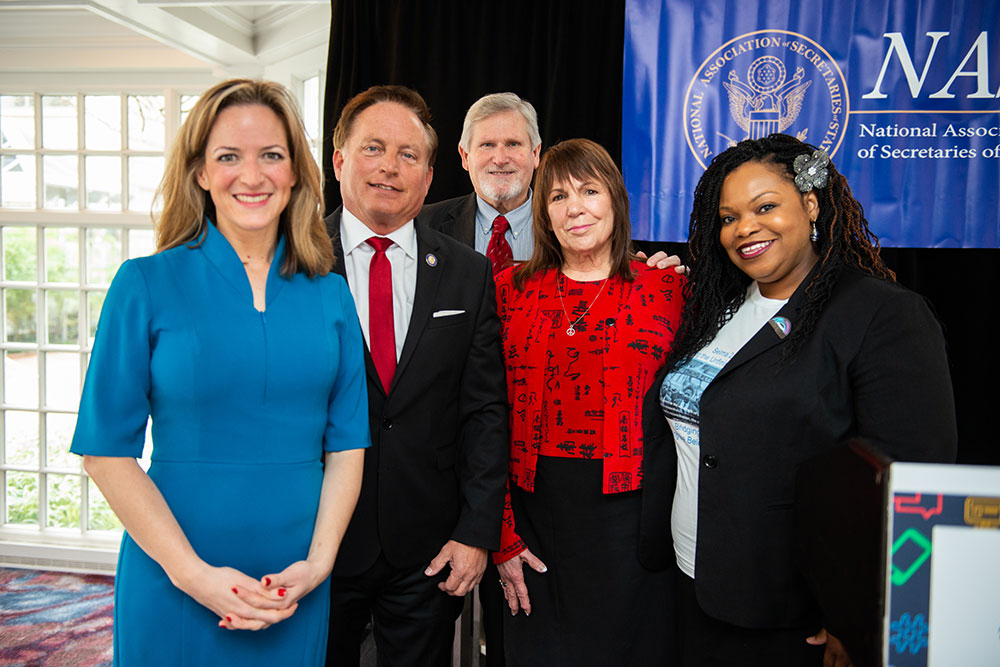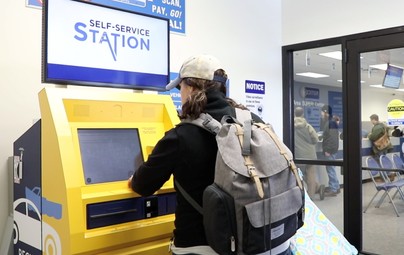13-member panel will draw fair and impartial electoral maps for Legislature, Congress
GRAND RAPIDS – Leaders of a nonpartisan statewide alliance joined with Michigan Secretary of State Jocelyn Benson today in Grand Rapids to announce that people can now apply online to serve on the new Michigan Independent Citizens Redistricting Commission, beginning Michigan’s effort as one of the first states in the nation to initiate a citizen-led redistricting process.
“Last fall, millions of Michiganders voted to give citizens the power to draw our legislative districts, and now it is time to apply to be one of those citizens,” Benson said during a news conference at Grand Rapids Community College. “This is a first-of-its-kind opportunity for Michigan voters to draw fair and impartial electoral maps for our state. I hope every Michigander considers applying to participate.”
Last November, Michigan voters decisively supported the “Voters Not Politicians” constitutional amendment that makes a commission of 13 randomly selected citizens – not elected politicians, consultants or lobbyists –responsible for drawing district lines for the Michigan Senate, Michigan House of Representatives and U.S. Congress. All eligible Michigan voters are encouraged to apply to serve on the commission, which does not require any special skills or expertise. The application, available at RedistrictingMichigan.org, takes about 15 minutes to complete. Commissioners will be compensated about $40,000 for their service.
“As a longtime advocate for independent citizen redistricting, I am committed to ensuring this process is implemented with transparency so voters can have faith that the entire process is truly independent and citizen-led,” Benson said.
Among the state and local leaders who said their organizations will help inform and promote wide public participation in the commission from communities across Michigan were Sean Huizing, a Grand Rapids Community College student volunteer and civic engagement liaison on Michigan’s new Collegiate Student Advisory Task Force; Joel Pagel, vice president for external affairs for the Grand Valley State University Student Senate; Martha Gonzalez-Cortes, vice president of community investment for the Kalamazoo Community Foundation; Anthony J. Minghine, deputy executive director and COO of the Michigan Municipal League; Josh Westgate, board of directors for the Michigan Townships Association; and Jamie Lyons-Eddy, director of campaigns and programs for Voters Not Politicians.
In addition to offering the online application at RedistrictingMichigan.org, the state will hold application workshops, coordinate a statewide grassroots education push to promote awareness of the application, and mail tens of thousands of applications to randomly selected Michigan registered voters by Jan. 1, 2020, inviting them to apply to serve on the commission. The randomly selected 13-member redistricting commission will consist of four members who affiliate with the Republican Party, four members who affiliate with the Democratic Party and five members who are not affiliated with either major party.
The workshops, which will provide citizens with step-by-step instructions to fill out the applications and an opportunity to have them notarized, are tentatively scheduled for the following dates and locations:
· Dec. 3 in Traverse City
· Dec. 6 in Marquette
The state constitution requires each completed application to be signed in the presence of a notary. Starting Dec. 1, all Michigan Secretary of State offices will offer free notary services for the purposes of this application. In addition, city, county and township clerk offices throughout the state have offered to provide notary services for free for the redistricting commission application, or will provide applicants with information on where and how to get their application notarized free of charge. A list of Michigan notaries providing the notary service for free on this application can be found at Michigan.gov/FreeNotary.
“As one of the students selected to serve on the Secretary of State Collegiate Student Advisory Task Force, I believe it is important that young people learn about the new Michigan redistricting process and consider applying to serve,” Huizing said. “Our generation is the future of Michigan’s democracy, so I hope fellow students will consider applying to the Commission.”
GRCC’s Huizing is one of 33 Michigan students representing institution of higher education on the Collegiate Student Advisory Task Force. The members represent 31 communities across Michigan and 23 community colleges, colleges and universities statewide. Their recommendations to increase engagement among young people in Michigan will be submitted to Benson in late November. In 2020, the students also will work with the Secretary of State’s Office as civic engagement liaisons to their respective campuses.
“It is imperative that student leaders on all of Michigan’s campuses make their classmates aware that every applicant who is eligible and submits a complete, notarized application will have a chance of being randomly selected to serve on the Redistricting Commission and help determine the future of Michigan’s democracy,” GVSU’s Pagel said.
Every 10 years following the U.S. Census, district lines for political offices must be redrawn in states across the country to accurately reflect their population. Under Michigan’s new constitutional provision, voters charged the Secretary of State with administering the application and selection process of commissioners, as well as providing administrative support as the “Secretary without a vote” of the commission once it is formed.
The randomly selected commission of citizens will each earn approximately $40,000 as compensation for their service. Commission members also will have the authority to choose whether to reimburse their travel and other related expenses as part of their duties.
The commission will convene in the fall of 2020 and will be required to enact district maps no later than Nov. 1, 2021. They will set meeting dates and other commitments within those parameters upon convening.
Work hours and schedule will vary depending on the week and be determined by the commissioners. Some weeks, the time commitment may be limited to a few hours, while others may be much more intensive. The work will vary throughout the year to include public meetings, at least 15 constitutionally required public hearings, and other discussions the commission finds necessary to fulfill its service to the state.
Any registered and eligible voter in the state may apply to serve on the commission. However, the constitutional amendment outlines certain groups of people who are not eligible to serve on the commission, including partisan political officials, candidates, registered lobbyist agents, and their employees or close relatives. Lying on the application is a criminal offense, punishable under penalty of perjury.
Applicants do not need to have any prior knowledge or experience in drawing legislative districts. Commissioners will be able to hire experts and consultants to assist with their work. Once the commission is selected, there will be a training and education session to prepare commissioners for their work. The random selection process will use accepted statistical weighting methods to ensure that the semi-finalist candidate pool mirrors the geographic and demographic makeup of the state.
To ensure transparency, the Michigan Department of State has engaged the Rehmann Group, a third-party, independent accounting firm, to administer the actual random selection using statewide data from the American Community Survey of the U.S. Census Bureau.
The initial months of the commissioners’ work will involve collaborating with each other to establish a committee structure and procedures, hiring staff and outside experts, and developing a plan for citizen engagement. The work will later involve efforts to gather the input and advice of other citizens as maps are being drawn and considered. Similarly, it will involve reviewing map submissions from the public and taking them into account. Ultimately, a majority of commissioners – including at least two who affiliate with the Democratic Party, two who affiliate with the Republican Party, and two who do not affiliate with either party – will need to vote for the final districts for state House, state Senate and U.S. congressional districts in Michigan.
Important dates:
Jan. 1, 2020 – Applications to serve on the commission will be mailed to at least 10,000 Michigan registered voters at random.
June 1, 2020 – Deadline for accepting applications.
July 1, 2020 – Deadline for Department of State to post 200 randomly selected semi-finalists online and to provide the list to legislative leadership for one month of review.
Aug. 1, 2020 – Deadline for legislative leaders (Speaker of the House, House Minority Leader, Senate Majority Leader and Senate Minority Leader) to exercise up to 5 strikes each and return the list of finalists to the Department of State.
Sept. 1, 2020 – Deadline for randomly selecting the 13 commissioners.
Oct. 15, 2020 – Commissioners must hold first meeting by this date.
Nov. 1, 2021 – Deadline for the commission to adopt a redistricting plan for Michigan State House, Michigan State Senate and U.S. Congressional Districts.
Dec. 31, 2021 – Maps become law and take effect for the 2022 election cycle.
For more information about the Michigan Independent Citizens Redistricting Commission, please visit: RedistrictingMichigan.org.







